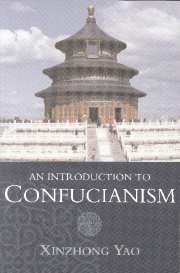Book contents
- Frontmatter
- Contents
- List of illustrations
- Preface
- Confucianism in history: chronological table
- Introduction: Confucian studies East and West
- 1 Confucianism, Confucius and Confucian classics
- 2 Evolution and transformation – a historical perspective
- 3 The Way of Confucianism
- 4 Ritual and religious practice
- 5 Confucianism and its modern relevance
- Select bibliography
- Transliteration table
- Index
- Plate section
3 - The Way of Confucianism
Published online by Cambridge University Press: 05 June 2012
- Frontmatter
- Contents
- List of illustrations
- Preface
- Confucianism in history: chronological table
- Introduction: Confucian studies East and West
- 1 Confucianism, Confucius and Confucian classics
- 2 Evolution and transformation – a historical perspective
- 3 The Way of Confucianism
- 4 Ritual and religious practice
- 5 Confucianism and its modern relevance
- Select bibliography
- Transliteration table
- Index
- Plate section
Summary
According to Confucian understanding, the world is sustained by, and structured around, three ultimates (sanji), which are also termed the three powers of the universe (sancai): tian (heaven), di (earth) and ren (humans). These three powers work together in an organic cosmos so that ‘Heaven, Earth and humans are the origin of all things. Heaven generates them, Earth nourishes them and humans perfect them’ (Chunqiu Fanlu Yizheng, 1992: 168). The Confucian discussion of Heaven lays down a solid foundation for its metaphysical view of the world, its understanding of Earth links the present to the past, and its approach to humankind seeks the full realisation of human potentiality. The three dimensions of the universe share the same nature, and their relationship is characterised by harmony rather than opposition or confrontation. The Book of Changes presents them as three modes of the same Way: the Way of Heaven is called the yin and yang, the Way of the Earth is called the yielding and the firm, and the Way of Humans is called humaneness and righteousness (Chan, 1963a: 268; Zhouyi Dazhuan Jinzhu, 1979: 609). Heaven and Earth are sometimes combined to refer to the metaphysical and material world, in which humans live and act, and by which humans organise their life and guide their behaviour.
The Way (dao) is fundamental to the Confucian view of the world, concerning the question of the ultimate meaning of human existence (Roetz, 1993: 101–3).
- Type
- Chapter
- Information
- An Introduction to Confucianism , pp. 139 - 189Publisher: Cambridge University PressPrint publication year: 2000
- 1
- Cited by



